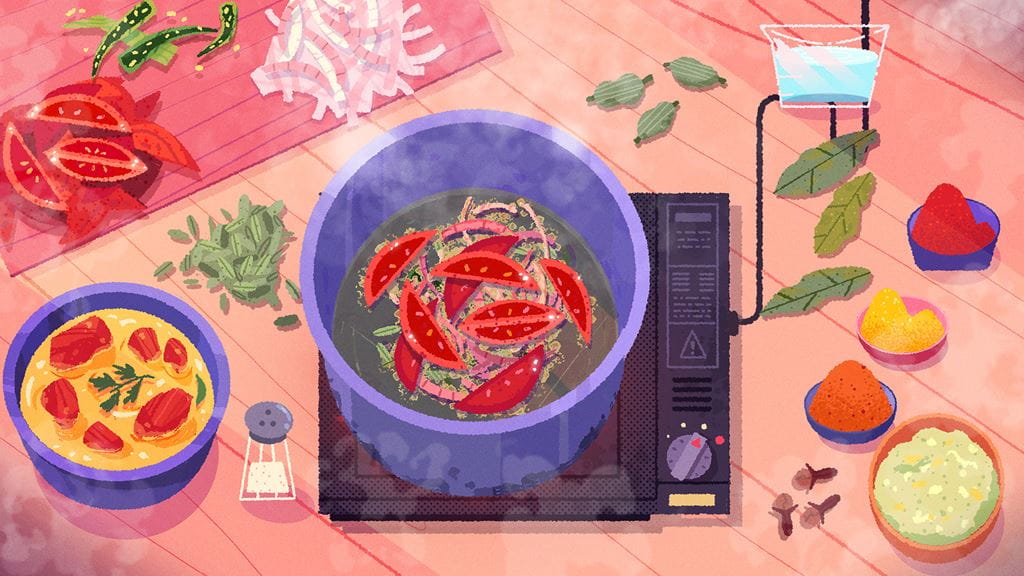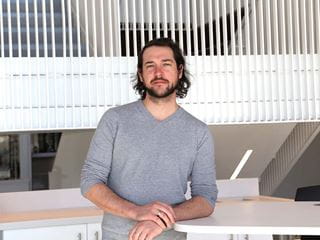
Bachelor of Game Design graduate reveals the comfort and connection wrapped in a recipe in Venba
 by Olivia McLeod – Jul 31, 2023
by Olivia McLeod – Jul 31, 2023  Canada’s multiculturalism is sometimes described as a “tossed salad” – a way to succinctly illustrate how individuals from a variety of cultures can integrate while still maintaining their separate identities. As the Art Director for a new video game called Venba, Sam Elkana (Bachelor of Game Design, ’17) has taken this metaphor and drawn it to the next level.
Canada’s multiculturalism is sometimes described as a “tossed salad” – a way to succinctly illustrate how individuals from a variety of cultures can integrate while still maintaining their separate identities. As the Art Director for a new video game called Venba, Sam Elkana (Bachelor of Game Design, ’17) has taken this metaphor and drawn it to the next level.
Venba brings a classic Canadian immigrant storyline to life. Players become the titular character, a mother of Tamil descent, who uses cooking and the traditional recipes from her culture to maintain her family’s connection to her roots. Throughout the narrative of the game, players cook these dishes, help her restore lost recipes, participate in intricate family conversations, and explore the vibrant world Elkana has brought to life.
Venba begins the game newly pregnant, having just left India with her husband and preparing to start a new life with their unborn child in 1980s Canada. Elkana says setting the game in this time period was deliberate to show how the world around Venba and her family changes over the next 30 years. For instance, the dishes become gradually more complex over the decades, indicating wider access to various imported ingredients, and a change to more open-minded eating habits nationwide.
“We didn’t approach this thinking we had to represent a certain culture at all costs. That often happens in gaming and comes across as shallow. What we’re hoping to show is something much deeper that comes with representation.”
– Sam Elkana
The game includes many elements of Tamil culture, including authentic handpicked recipes from regional Southern Indian cuisine, culturally accurate and stunning animations, and even a unique soundtrack heavily inspired by Indian musicals. These details all come together to show how Venba uses cooking as both a connection to her culture, and as a way in which she and her family can express their love for one another through pivotal moments in their lives.
Generating considerable buzz in the last year, Venba has been featured in The Guardian, The Indian Express, CBC Radio, and at last year’s Nintendo Indie World Showcase. After over three years of working on the project, Elkana says the meaning behind the story is one that he and multiple members of the team can relate to.
“I remember when Abhi (Venba’s creative director) texted me about it. I was at a Chinese restaurant with my mom and my sister,” he recalls. “And it really landed with me because it was about something I could relate to. My parents aren’t Canadian immigrants, so it’s not quite the same, but my mom and my dad sacrificed so much for me and my sister to come to Canada. So, when I read that I thought, ‘Wow, that’s such a good idea’.”
Elkana was born and raised in Indonesia. At the age of 17, he followed his older sister and moved to Canada to seek broader education opportunities. He made it to Sheridan just in time to join the Bachelor of Game Design’s first cohort, graduating in 2017. The small size of the program made making friends and learning about life in Canada much easier for Elkana, who had only been in the country for a year before enrolling.
“The program is what allowed me to land all my jobs after graduation,” he says. “There were many courses that taught me to speak the same language as programmers and understand how to make a game from the ground up. And coming from an artist’s perspective, with the art industry as competitive as it is, game design really helped me to have a more well-rounded knowledge of creating games.”
Upon graduation, he worked for Toronto-based studio Uken Games, where he met Abhi, who goes by only one name. Elkana, Abhi and their team of eight game developers started Venba alongside their full-time jobs, working tirelessly to ensure all the elements of the game came together to create a meaningful and fun story. Eventually they both shifted to working full-time on the project, with Abhi creating Visai Studios to market and option the game.
“Abhi is from Southern India, and so the game is based there to give it his personal touch,” he says. “Which was sometimes challenging for me because I’ve never been to India before. But surprisingly, during our process and research, we found that there are a lot of similarities between Indonesia and Tamil culture. This made it even more exciting to be a part of.”
Venba’s storylines wind their way across decades to land in the late 2010s. Elkana says ending the game here was a deliberate choice, one he hopes will send a powerful message to all players that universal experiences can be found within specific stories, even if they are completely different to your own life.
“Venba is not a typical cooking game. We’re trying to tell a genuine story. And the representation of the game comes from how genuine that story is,” he explains. “We didn’t approach this thinking we had to represent a certain culture at all costs. That often happens in gaming and comes across as shallow. Our idea came purely from a place of ‘let's tell a story about an immigrant family in Canada and their struggles’. We’re hoping to show something much deeper that comes with representation.”
Media Contact
For media inquiries, contact Sheridan’s Communications and Public Relations team.





